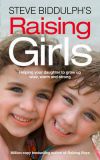
01 Feb 2013 01:43:23
Fifteen years ago, according to Australian child psychologist Steve Biddulph, girls were "on the move, going places, focused and confident", while boys were "somehow all wrong". Raising Boys, the breezy, warm-hearted book he wrote to combat this "disaster area", sold millions and made him into an international parenting guru. Subtitled "Why boys are different", it claimed to challenge decades of fashionable consensus that the sexes were essentially the same, highlighting differences in brain development and listing "amazing testosterone facts". Biddulph's key recommendations were that boys should start school later than girls, and that their need for male role models should be better addressed. He was careful to say, though, under the jaunty heading "Danger – sexism alert!", that gender differences are slight, not universal and can be overcome. The spirit of the book was a more general call for parental engagement: the sentence that most challenged the status quo did not concern educational shibboleths or biological determinism, but paternal absence."If you routinely work a 55- or 60-hour week, including commute times, you just won't cut it as a dad. Your sons will have problems in life, your daughters will have self-esteem issues, and it will be down to you."
That consensus Biddulph refers to about treating the sexes the same may come as news to anyone brought up in the 70s and 80s. What can't be denied is that since Raising Boys was first published, both biological determinism and gender stereotyping in children's lives are back with a vengeance: in 2013, there's no need for a subtitle about girls being different.
Raising Girls: Helping Your Daughter to Grow Up Wise, Warm and Strong is a response to what Biddulph identifies as a "sudden and marked plunge in girls' mental health" over the past five years, years during which the growth of social media has encouraged anxiety and narcissism, childhood exposure to pornography has increased, and corporations have made millions from the pinkification of girlhood. "The world today does not seem to care about girls at it should, and sees them just as a way to make money."
Though Biddulph's books are busy with pop facts from the kinds of research studies challenged in Cordelia Fine's Delusions of Gender or Natasha Walter's Living Dolls – girl babies "prefer" looking at faces, boys are "hardwired" to deal with objects and systems, etc, etc – his project has always been gently antisexist. Discussing the different ways adults speak to boy and girl toddlers, he says: "I am sure that no parent ever sets out to disadvantage their girls around useful number skills, yet we unconsciously start making the boys practical and the girls emotionally focused. So here's a suggestion, perhaps we ought to reverse this."
It's incredibly refreshing to see what is essentially a feminist and anticorporate call to arms in a populist parenting manual. Biddulph is infuriated by Lego Friends, the girls' version of the toy launched last year ("Five curvy little friends who bake, home-make, decorate, hairstyle and shop! Anything gender limiting in that little selection?"). On the subject of toys, he is categorical: "Avoid anything aimed just at girls. The world does that quite enough already." As girls get older, he calls on parents to resist advertising and the fashion, food and weight-loss industries, and campaign to raise the drinking age to 21. Throughout, he champions community over the atomisation of modern family life and the isolating qualities of the online world; as in Raising Boys, he has a nostalgic weakness for "old societies", with their initiation rites and bonds with nature.
Biddulph explores girlhood through five stages: security, exploration, learning to get along with others, finding one's passion or "spark", and preparing for the freedom and responsibilities of adulthood. Along the way he identifies danger zones specific to girls, from insecure attachment leading to a martyr role in relationships, to parents letting their teenagers be "too sexy too soon". This isn't a long book, and his brisk treatment of tabloid bugbears such as pro-anorexia websites or sexting can feel sketchy. There's hardly anything on divorce or single parents; Biddulph assumes a nuclear family, with plenty of aunts and interested adult friends ready to act as role models, and the Australian outback at close hand for soul-searching treks into the wilderness. He is unashamedly didactic (drastically limit TV and tablet use, don't drink in front of your children), sometimes to the point of comedy (tickle your kids, dads, but never while driving; don't forget to wash).
Many parents will be exasperated by Biddulph's views on daycare – he is scathing about nursery for under-threes – or scornful of his hippyish talk of "soul journeys". (On the other side of the culture clash, he was horrified by the "unpleasantness" of our cosy TV sitcom My Family.) Yet though his relentless utopianism – "If kids aren't waking up in the morning saying, 'Wow! School today!', then something is not right" – can seem unrealistic, his joyfulness is also part of his charm.
There are social pressures on girls and young women that go far beyond the remit of a parenting manual, and economic pressures on parents that keep them from their children. But the individual power that Biddulph locates within family life, and the continuum of struggle for gender equality, is never less than inspiring. "Your daughter needs to know she is part of a bigger story; a fight that has been fought on her behalf, long before she was born, and that she needs to keep fighting." I'll drink to that, possibly even in front of my daughters.

